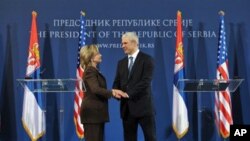Secretary of State Hillary Clinton urged Serbia's leaders Tuesday to open early reconciliation talks with Kosovo, the former-Serb province that declared independence in 2008. Serbian President Boris Tadic said his government is open to wide-ranging talks with Pristina authorities, but will not recognize Kosovo.
The two sides differ fundamentally on Kosovo, which Clinton will visit on Wednesday. But the Clinton-Tadic meeting was cordial, with the secretary praising the overall moderation of the Belgrade government, and calling Serbia an excellent candidate for European Union membership.
Clinton said the two governments still disagree on some issues and Kosovo is foremost among them. She said Belgrade should heed a recent United Nations call for dialogue with Kosovar authorities.
"We believe that the September 9th United Nations General Assembly resolutions provides a good basis for a meaningful, forward-looking dialogue between Belgrade and Pristina. That dialogue can and will benefit people on Kosovo and Serbia by addressing practical day-to-day issues and the long term relationship between you," she said.
Mr. Tadic said his government will not recognize Kosovo, but respects the rights of ethnic-Albanians in the region and is ready for early talks on easing regional tensions.
"The dialogue has to start soon. We want to discuss all the issues relative to the daily life of people in Kosovo, peacefully, diplomatically, using political and legal means to protect the integrity of our country. I have also said that any unilateral actions of the Albanian institutions in Kosovo puts Serbia into an untenable position - Serbia and Serbia's government. It does not contribute to the dialogue," he said.
The Serbian President drew praise from Clinton for reiterating his government's determination to bring to justice Ratko Mladic and Goran Hadzic, the most high-profile Balkans war crimes figures still being sought by the international tribunal at the Hague.
He said the pledge is part of his reform government's determination to in his words, "close this dark book of the 1990's." Again he is heard through an interpreter.
"Serbia is not doing this just for the sake of the international tribunal or the sake of the international community. We are doing it for our own sake, for our own citizens and for reconciliation in the region. I will say it again: even if the tribunal was disbanded tomorrow, we would carry on our search for the two fugitives," he said.
Clinton began the day in neighboring Bosnia-Herzegovina, where she challenged all sides in the ethnically-divided country to embrace reforms needed for EU and NATO membership.
At a town hall meeting in Sarajevo with university students, the secretary stressed U.S. opposition to talk of secession by Bosnia's Serb republic, which has been in a bitter political standoff with the country's Muslim-Croat federation.
"We do not support any secession or threats of secession from anyone. Because we think it is a losing proposition. And it does not in any way reflect what our analysis has concluded, which is that Bosnia-Herzegovina together is much stronger, more able, and more likely to move toward an integrated European future than if it is coming apart," she said.
Clinton conferred in Sarajevo with the three-member Bosnian presidency and met briefly at an embassy reception with Milorad Dodik, the newly elected president of the Serb republic, who has rejected international calls for improved intra-Bosnian relations.
Clinton Urges Serbia to Open Talks with Kosovo




